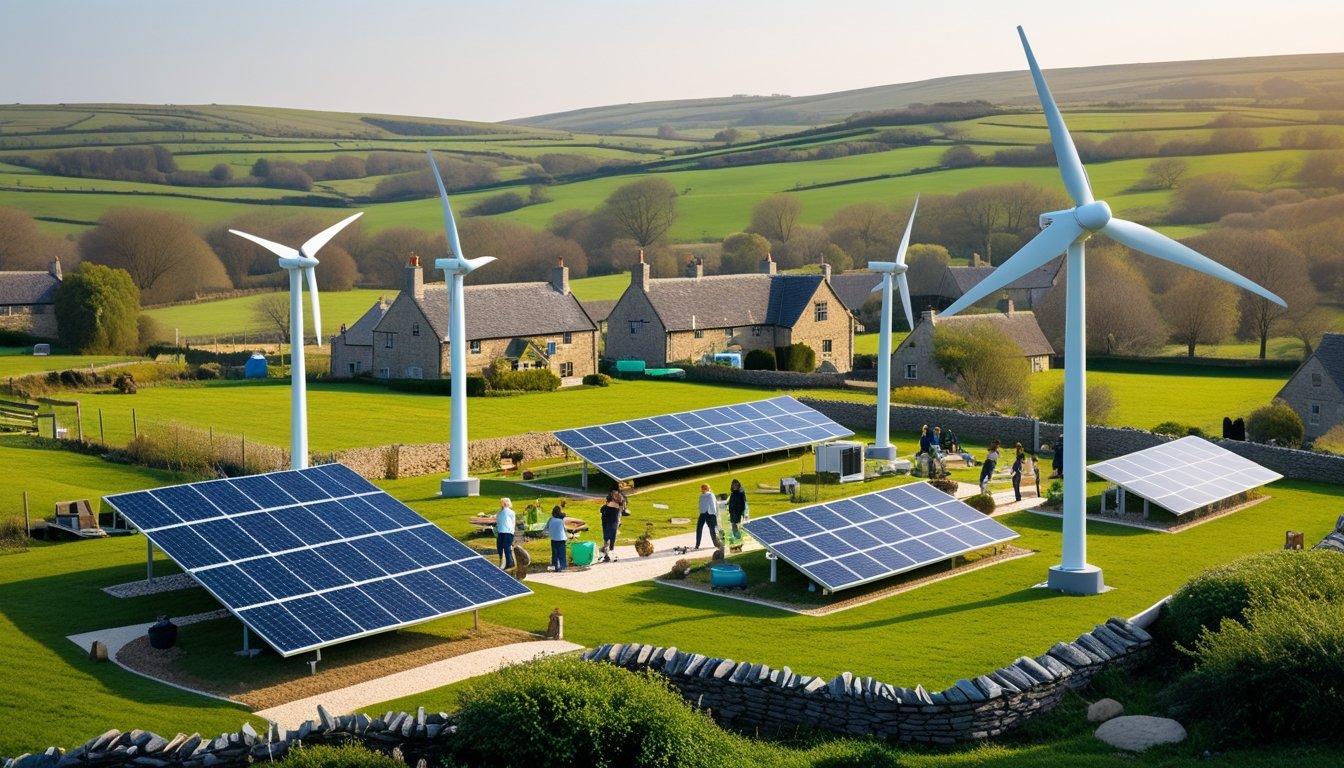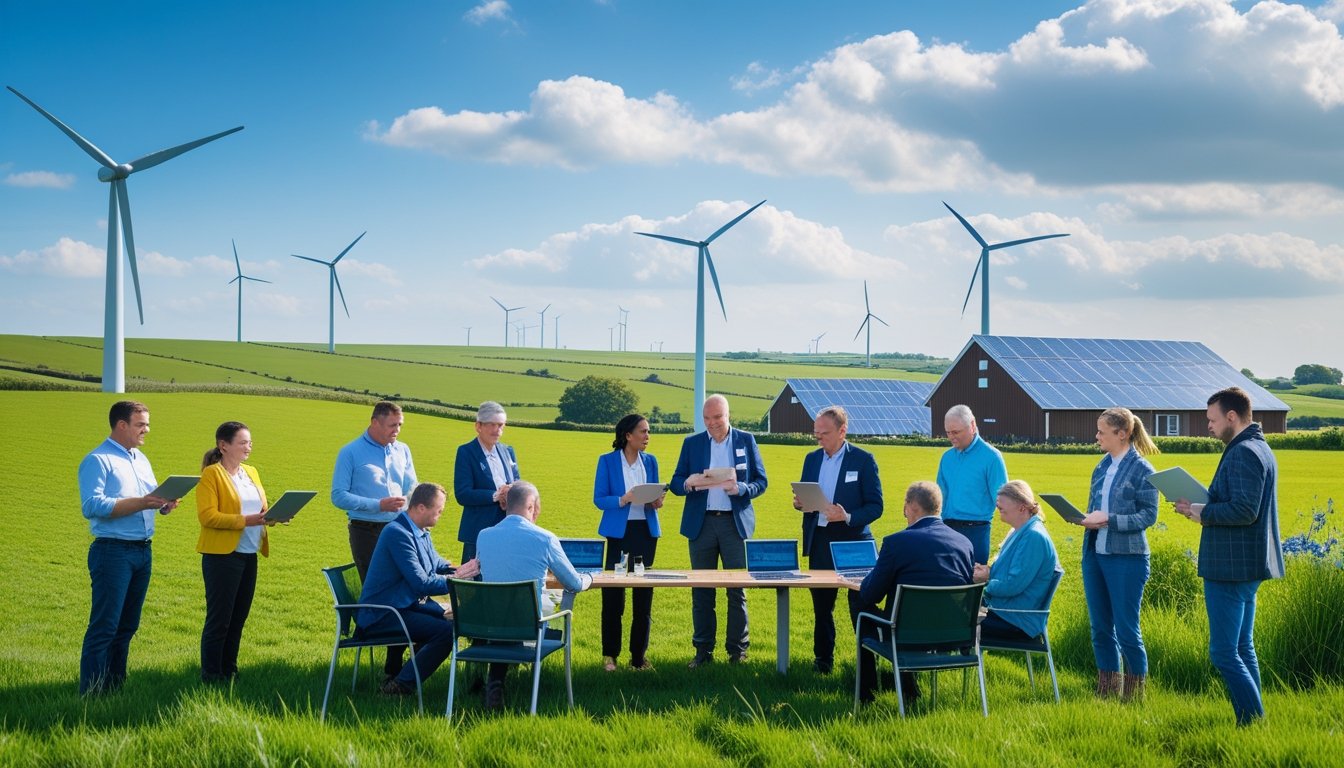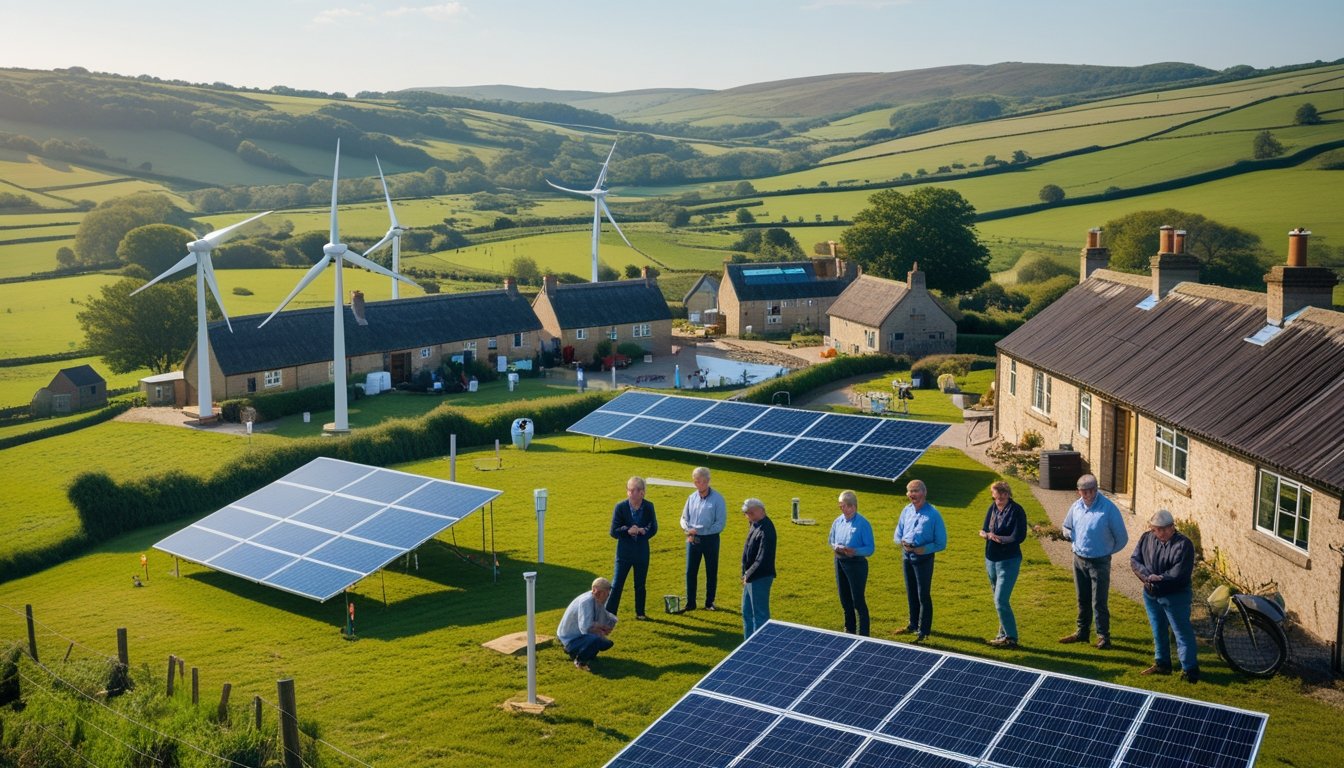Late updated: 06 Jul 2025 12:07
Written by: Oliver Bennett
Renewable Energy Innovation for UK Rural Communities: Driving Sustainable Change
As we stand on the brink of a new energy era, rural communities across the UK are poised for a transformation. These areas, often hampered by outdated infrastructure, face unique challenges in achieving sustainable energy. Investments in renewable technologies like wind turbines and solar panels are empowering these communities to embrace clean energy solutions, offering both economic and environmental benefits.

Local initiatives, backed by government funding, are catalysing this transition, providing not only the resources but also the motivation for communities to engage in the renewable energy revolution. By supporting projects that integrate smart systems and harness local resources, these programmes ensure that even the most remote areas have the opportunity to thrive sustainably. This surge of innovation promises greater resilience in the face of energy fluctuations.
Our collective journey towards a net zero future hinges on continued support and collaboration. As we explore the pathways available, the focus remains on scalable solutions that are tailored to the needs of rural locales. The promise of renewable energy innovation holds the key to redefining how these communities power their lives, ensuring sustainability for generations to come.
Key Takeaways
- Renewable investments empower UK rural communities.
- Government funding supports local energy projects.
- Collaboration is key to a net zero future.
Key Innovations in Renewable Energy for UK Rural Communities
In the UK, rural communities are at the forefront of renewable energy innovations. These endeavours not only address energy supply challenges but also promote sustainable development. By focusing on smart grids, community-led projects, and energy storage, these communities enhance their resilience and environmental impact.
Smart Grid and Metering Technologies
Smart grid and metering technologies are transforming the way rural areas manage energy resources. By integrating real-time data and analytics, these technologies improve energy efficiency. Smart meters allow us to monitor consumption accurately, helping rural households optimise energy usage.
Moreover, smart grids facilitate the incorporation of renewables like solar and wind into the local grid. They enhance the reliability of our energy supply by dynamically adjusting to demand fluctuations. This shift not only reduces energy costs but also decreases reliance on traditional energy sources.
Community-Led Renewable Energy Projects
Community-led renewable energy projects are pioneering efforts in rural settings. These initiatives empower local residents to invest in and manage their own energy resources. Wind turbines, solar panels, and biomass plants are popular choices for these community projects. The benefits of these initiatives are twofold.
They create financial savings and generate revenue by selling excess energy back to the grid. Moreover, they build local socio-economic resilience, offering employment opportunities and community engagement. As communities gain control, they become more adept at meeting their sustainable energy needs.
Advanced Local Energy Storage Solutions
Advanced local energy storage solutions are crucial for effective renewable energy utilisation. Batteries, like lithium-ion and flow batteries, store excess energy generated from renewables. This stored energy is vital, particularly during periods of low production.
Energy storage systems ensure consistent energy supply, even during off-peak times or adverse weather conditions. By using these systems, we can reduce strain on the grid and enhance our community's self-sufficiency. As technology advances, the efficiency and capacity of these systems continue to improve, making them more accessible and cost-effective for rural communities.
Pathways to Net Zero: Funding, Engagement, and Decarbonisation Initiatives

Achieving net zero goals requires comprehensive strategies that integrate funding, community engagement, and decarbonisation projects. In this section, we'll explore available funding avenues, effective strategies for rural decarbonisation, and ways to enhance community involvement in sustainable initiatives.
Community Energy Fund and Government Support
Government funding is pivotal in driving local net zero initiatives. The Community Energy Fund, a recent £10 million programme, aims to empower communities across England to launch clean energy projects. Five Net Zero Hubs—serving the Midlands, North East, North West, South East, and South West—manage this fund, offering financial support to develop renewable energy solutions tailored to rural areas.
Government-backed programmes like the Net Zero Innovation Portfolio offer funding for low carbon technologies. This ensures the continuous development and implementation of innovative solutions, vital for reducing carbon emissions. Public sector grants also play a role, enabling organisations to develop heat decarbonisation plans and improve infrastructure sustainability.
Strategies for Decarbonising Rural Areas
Decarbonising rural regions poses unique challenges and opportunities. Rural areas can benefit significantly from adopting renewable energy sources such as solar, wind, and bioenergy. These options provide energy diversification and resilience, which are crucial for isolated communities.
Implementing energy-efficient technologies in agriculture and transport is essential. By reducing energy demand through efficient machinery and electric vehicles, rural areas can lower their carbon footprint. Collaboration with local governments and businesses to create tailored decarbonisation plans ensures these areas contribute effectively to national net zero targets.
Maximising Community Engagement for Sustainable Projects
Community engagement is crucial for the success of renewable energy projects. For rural initiatives to thrive, they must involve local residents from the planning stages. This can be achieved through public consultations and participatory workshops, ensuring that projects align with community needs and priorities.
Empowering local leaders and champions to spearhead projects fosters ownership and long-term commitment. It is also important to provide educational resources, raising awareness about the benefits of renewable energy. By fostering a collaborative environment, we can ensure the widespread adoption of sustainable practices that contribute to a net zero future.
Frequently Asked Questions

In the quest for sustainable energy solutions, UK rural communities are increasingly looking towards renewable energy innovations. Specific benefits, funding opportunities, and technological options are crucial for successful implementation.
How can rural communities in the UK benefit from renewable energy advancements?
Renewable energy can reduce energy costs for communities, increase energy security, and create local jobs. These technologies also help decrease dependency on fossil fuels, thus reducing environmental impact and promoting self-sufficiency.
What funding schemes are available for implementing renewable energy solutions in UK rural areas?
Rural communities can access the Rural Community Energy Fund (RCEF), a £10 million programme supporting project development. Additionally, energy companies often contribute to funding pots for renewable projects, helping to alleviate financial barriers.
Which renewable energy technologies are most suitable for deployment in UK's rural settings?
Solar panels and wind turbines are commonly used in rural areas due to their scalability and efficiency. Additionally, small-scale hydroelectric systems and biomass installations can be effective, depending on local resources and geographical conditions.
What challenges do UK rural communities face in adopting renewable energy innovations?
Challenges include high initial costs, outdated grid infrastructure, and geographical isolation. Limited access to technical expertise and financial resources can also hinder progress, making community engagement and education vital.
How does the UK government support rural communities in the transition to sustainable energy?
The government provides financial support through various grants and funds, such as the RCEF. Policy initiatives and legislative measures further encourage the adoption of renewable technologies, aiming to achieve net-zero emissions targets.
What role do community-led initiatives play in promoting renewable energy in rural parts of the UK?
Community-led projects drive renewable energy adoption by harnessing local knowledge and resources. These initiatives foster local investment, ensure energy solutions are tailored to community needs, and enhance community resilience.
